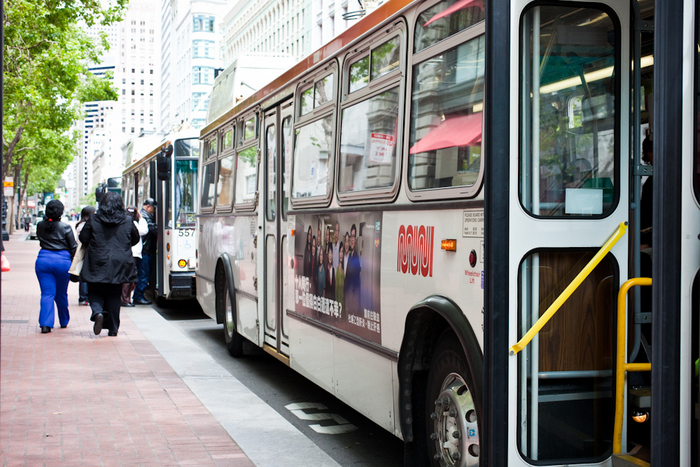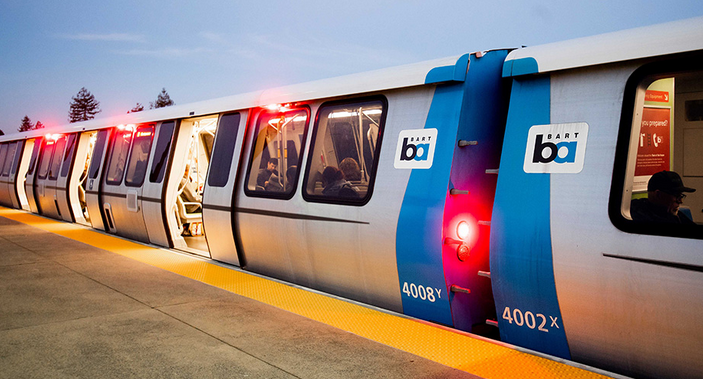The SFMTA Board of Directors yesterday approved a two-year budget that calls for parking meter enforcement on Sundays and free Muni passes for low-income youth. The budget must still be approved by the Board of Supervisors before it goes into effect on July 1.
As Streetsblog reported yesterday, the SFMTA Board approved a free youth pass program for low-income students but didn't extend it to all students. With agency staff saying that free Muni for everyone under 17 would trigger maintenance cuts, board members didn't think that expanding the free rides for student was worth the trade-off. However, advocates from POWER, the organization leading the free Muni for youth campaign, argued that the board was presented with a false choice.
"Making bus maintenance a trade-off with free Muni for all youth is a false, random and last-minute attempt to limit the board’s choice to free Muni for low-income youth," said a statement released by POWER the day before the meeting. The organization contended that the SFMTA overlooked opportunities to use available regional funds dedicated to programs for low-income riders and improving air quality. Free Muni for all youth, they argued, would get more middle- and upper-income students to take Muni instead of being driven by their parents.
SFMTA Director of Transportation Ed Reiskin "respectfully disagreed" with POWER's assertion, arguing that finding additional funds for an all-youth program would come with "real trade-offs." The $6.6 million in proposed cuts would have come from $3.8 million in maintenance, $2.1 million in state funds for "transit projects in low-income neighborhoods," and $700,000 to help fund Department of Public Works projects that would include bike and pedestrian improvements. Those funds were "the lowest priority" available, he said.
The $9.6 million for the low-income-only program, which is projected to be open to half of San Francisco students (based on SFUSD's free and reduced lunch program), will not come out of maintenance funds, said Reiskin, but mostly from $5 million in outside grants that the SFMTA would not have otherwise received. The remaining $4.3 million will come from "general operating funds," according to an SFMTA document [PDF].
The board passed an amendment to assure advocates of its commitment to seek funding for an all-youth program in the next budget cycle. Upon approval of the low-income program, advocates expressed neither cheers nor jeers.
As for Sunday parking meters, all of the roughly two dozen opponents repeated claims that having to feed meters during church services would repel people from worship. Pastor Amos Brown of Third Baptist Church, who is no stranger to using incendiary rhetoric on the matter, said charging for parking on Sundays was sexist since, he claimed, most churchgoers are women.
Board member Joél Ramos rebuffed opponents' accusations by appealing to the very religious teachings they claimed to defend. "I've been called a lot of things in my life, but never the devil," said Ramos. "It's shocking to have heard that coming from a community that lives by, 'Judge not, lest ye be judged.'"
"The reason why I'm here on this board is because of my Christian teachings, particularly my Catholic teachings, saying that we should look out for those that are the least among us," he said. "People that don't have a car, or can't afford a car, are being pushed out of this city because they can't even take the bus."
"We are jam-packed to the gills" with car traffic circling for parking, added Ramos. "On Sundays, it's just as bad as it ever is, and that affects our transit, making it even more expensive to run."
Reiskin also pointed out that curb parking can be pre-paid prior to the onset of metered hours at noon, that drivers can pay meters by phone, and that time limits would be four hours long.
Also scrutinized was the SFMTA's $9 million in annual work orders to the SFPD's motorcycle traffic enforcement unit, which was once again included in the budget despite criticism in recent years that the SFMTA is footing an unjustified bill while making cuts in other areas. Reiskin defended the practice by arguing that ending it would only shove the problem to the city's shortfall.
"I don't think that it's fair for the ridership of Muni to pay for the entirety of that program," said Supervisor David Campos, who has led the charge for free Muni for youth at City Hall.
"I think it's appropriate for some of that money to be paid by other people who drive, other people in the city," he added. "So if you have the opportunity, at a minimum, to reduce that amount by half, that's four and a half million dollars that you can get back into the system so that you address issues like maintenance, so that you address issues like on-time performance."






